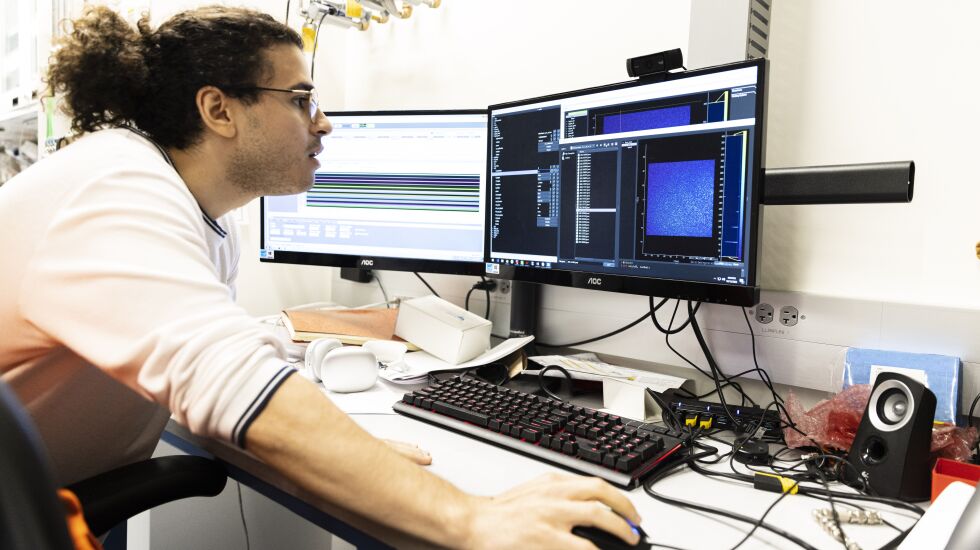
You gave up using your pet’s name for your password, endured two-step authentification and barely can keep track of all of your passwords. But you still get hacked. For many, it’s the bane of today’s digital existence.
Now, at two federal Department of Energy physics labs in the west suburbs, University of Chicago scientists are working on creating what once might have seemed like science fiction: an unhackable Internet.
It’s an effort that holds great promise to protect our personal data online and much more, experts say.
The Chicago quantum network project involves a test bed of 124 miles of underground fiber-optic cable that links the university’s Pritzker School of Molecular Engineering with Fermi National Laboratory in Batavia and Argonne National Laboratory in Darien. It’s one of the largest such networks in the country.
Their aim: to find ways to use quantum data to create a system that prevents online eavesdropping.

“What we’re looking at is: Can you transmit info in a secure way that is immune to hacking and protects your personal and privacy?” says David Awschalom, a U. of C. physics professor who heads the Chicago project. “We’re getting close.”
This network and others like it are being used to test the potential for encrypting and transmitting valuable data — for instance, your credit-card information, health records and Social Security number — at incredibly high speed while keeping it beyond the reach of anyone who shouldn’t have it.
In the early 1900s, Max Planck and others made ground-breaking discoveries about the behavior of matter and light at the atomic and subatomic scale — quantum physics. That ultimately led to computers, magnetic-resonance imaging, GPS and other technologies.
Yet harnessing the power of those subatomic particles remained elusive. No longer, Awschalom says: “We are there.”
As in quantum computing — using nature’s tiniest particles to solve problems far too complex for any non-quantum computer.
Scientists — and financial market-watchers who hope to profit from the new technologies that are expected to result — say this will create opportunities in communications, pharmaceuticals, finance and other fields. Beside protecting personal privacy, quantum computing is being looked as a tool, for instance, to curtail climate change.
According to McKinsey & Company, the management consulting giant, investment in the field doubled — to $1.4 billion — from just 2020 to 2021 and could reach $700 billion by 2035. Goldman Sachs, which was an early investor, has said it expects to be using quantum computing to price financial products in the next five years. Google, Amazon.com and IBM have built commercial quantum-computing cloud services. Some hospitals already use a form of quantum computing to protect patient data.
What all of these need is a safe way to communicate with other quantum computers.
The potential for practical applications is driving a global race to be first and best in the field that China now leads.
In 2018, President Donald Trump signed the National Quantum Initiative Act, a 10-year plan to accelerate the development of quantum information science and technology applications.
In 2020, the Department of Energy laid out a strategy to develop a quantum Internet.
Illinois has invested more than $200 million in quantum infrastructure and was the only state to win two federal grants to build national research centers for the technology, according to Gov. J.B. Pritzker’s office.
Awschalom says the network that his team is building sends unhackable information to multiple computers. Project partner Toshiba is testing it, and so is JPMorgan Chase, according to Awschalom, who says Verizon also is in talks to get involved.
The underground cable transmits encryption keys made up of photons — tiny particles of light — under streets and highways from Hyde Park to Argonne and Fermilab. These quantum-encoded keys can’t be hacked, Awschalom says, because they disappear when anyone attempts to intercept them.
“No one can hack it because they can’t read it,” he says. “Because the act of looking at it changes it. Destroys it.”

Quantum information follows its own rules. Classical information — the kind used for regular computers — is stored as a bunch of zeroes and ones. But quantum bits of information can have many states.
Cold, vibrations and other factors can affect its performance.
That’s why the Chicago network is underground and near tollbooths and highways — to see whether it can withstand cold winters and traffic.
And it has, Awschalom says, so plans are underway to extend the network next year to the University of Illinois at Urbana-Champaign and eventually to downtown Chicago.
“We’re learning what is missing, what works better, faster, and, now that we’re running in a real world environment, it will soon be clear,” he says.







